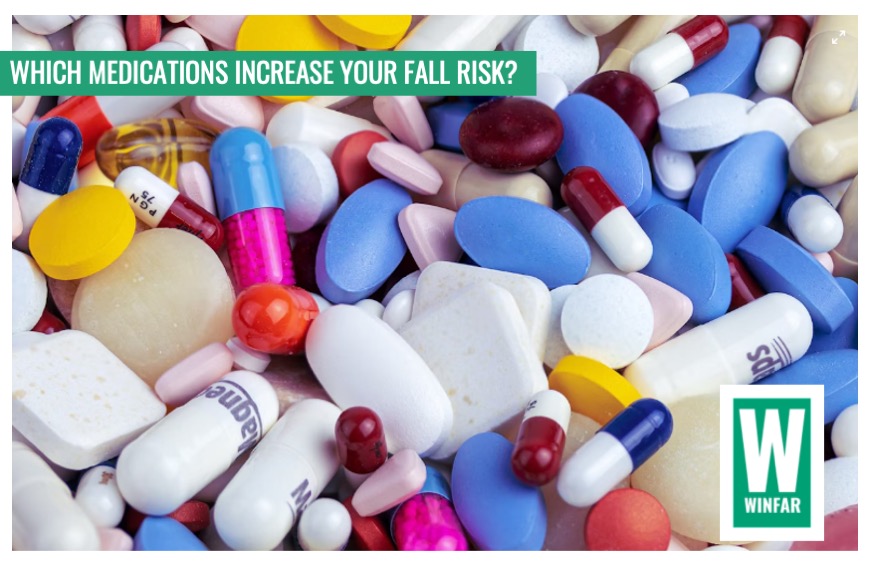Falls are a major reason for seniors to lose independence and mobility. More than one in four older adults fall each year, often causing serious injury.
To reduce your or your older adult’s fall risk, regular medication reviews are essential. That’s because many commonly used drugs are associated with an increase in fall risk.
In this article, Geriatrician Dr. Leslie Kernisan explains which medications to watch out for and why they could cause seniors to fall.
Having this information helps you work with your doctor to try to reduce or eliminate the use of these drugs. Or at the very least, you’ll be able to confirm that the benefits of the medication are worth the risk.
In her article, Dr. Kernisan groups 10 common medications that cause falls into 3 broader categories of drugs.
This article summarises the key points that explain what these drugs are used to treat, how they affect fall risk, and what to do if you or your older adult is taking any of these medications.
Medications that affect brain function
These drugs are often called psychoactives. They affect brain function and tend to cause drowsiness.
They can also cause or worsen confusion, especially in people with memory problems or dementia.
1.Benzodiazepines
Usually prescribed to help people sleep or to help with anxiety
Common drugs include Ativan, Valium, Restoril, and Xanax (generic names: lorazepam, diazepam, temazepam, alprazolam)
Warning: It can be dangerous to stop benzodiazepines suddenly. They should always be tapered under medical supervision
2. Non-benzodiazepine prescription sedatives
Usually prescribed to treat insomnia or trouble with sleep
Common drugs include Ambien, Sonata, and Lunesta (generic names: zolpidem, zaleplon, and eszopiclone)
3. Antipsychotics
Usually prescribed to control challenging behaviors in Alzheimer’s and other dementias
Sometimes prescribed to people with depression
Common antipsychotics are mainly second-generation, including Risperdal, Seroquel, Zyprexa, and Abilify (generic names: risperidone, quetiapine, olanzapine, and aripiprazole). Haldol (haloperidol), a first-generation antipsychotic, is sometimes still used
4. Anticonvulsants (seizure medications) and mood stabilizers
Depakote (valproic acid) is a mood stabilizer that is sometimes used to manage difficult behaviors in Alzheimer’s or other dementias
Neurontin (gabapentin) is another seizure medication often used to treat nerve pain
5. Antidepressants
Usually prescribed to treat depression or anxiety
Common drugs include Zoloft, Celexa, Lexapro, Paxil, Prozac, Remeron, Wellbutrin, and Effexor (generic names: sertraline, citalopram, escitalopram, paroxetine, fluoxetine, mirtazapine, bupropion, and venlafaxine)
Tricyclic antidepressants like Elavil and Pamelor (amitryptiline and nortriptyline) are anticholinergic so they’re not used for depression, but are sometimes used to manage nerve pain
Trazodone, an older antidepressant, is typically used as a mild sleep aid
6. Opioid (narcotic) pain relievers
Common drugs include codeine, hydrocodone, oxycodone, morphine, fentanyl, and methadone
Opioids often cause drowsiness and other side-effects
Research linking opioids with falls have mixed results, but experts like the CDC recommend that narcotics should be evaluated when working to reduce fall risk.
7. Anticholinergics
This group includes a large number of drugs that are anticholinergic, like most over-the-counter sleeping aids and many other prescription drugs
These drugs include: antihistamines like Benadryl, “PM” versions of over-the-counter pain relievers (Nyquil, Tylenol PM); overactive bladder medications like Ditropan and Detrol; medications for vertigo, motion sickness, or nausea like Dramamine, Antivert, Scopace, and Phenergan; anti-itch meds like Vistaril (hydroxyzine); muscle relaxants like Flexaril (cyclobenzaprine); tricyclic antidepressants and Paxil
Research linking these drugs with falls have mixed results, but because they cause drowsiness and other serious side effects, experts include them for review when working to reduce fall risk
Medications that affect blood pressure
These types of drugs can cause or worsen a sudden fall in blood pressure. A drop in blood pressure can increase fall risk by making someone feel dizzy or faint
8. Antihypertensives
Usually prescribed to treat high blood pressure
Research linking these drugs with falls have mixed results, but many geriatricians and other experts recommend including these for review
9. Other medications that affect blood pressure
Alpha-blockers are often prescribed to help men with enlarged prostate urinate
Common drugs include Flomax, Hytrin, Cardura, and Minipress (tamsulosin, terazosin, doxazosin, and prazosin)
Medications that lower blood sugar
Older adults who have diabetes take medication to lower blood sugar. Low blood sugar caused by these medications is associated with increased falls.
10. Medications that lower blood sugar
Most diabetes medications can cause or worsen hypoglycemia (blood sugar that’s too low)
What to do if you or your senior is taking these medications
If you or your older adult is currently taking one of these medications, don’t make any changes without talking with your doctor. Suddenly discontinuing a drug could cause serious harm.
Even if a drug they’re taking is associated with increased fall risk, it doesn’t always mean they shouldn’t be taking them.
The CDC recommends (The Centers for Disease Control and Prevention is the national public health agency of the United States) that seniors STOP medications when possible, SWITCH to safer alternatives where possible, or REDUCE medications to the lowest effective dose.
Together you should carefully consider the pros and cons of using a medication linked to increased fall risk.
Sometimes, the benefits will be worth it. In other cases, an alternative may be a better choice.
When one of these medications is being used, doctors should regularly review the need for and dosage of those drugs.

